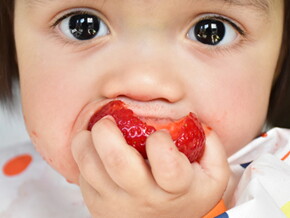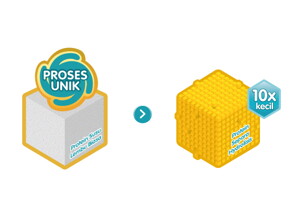
Why does your child need micronutrients anyway?
Why does your child need micronutrients anyway?
There are a lot of important factors in ensuring your child’s healthy growth and development. One of the key factors is ensuring your child’s diet contains an adequate, consistent amount of important micronutrients, especially iron!
There are a lot of important factors in ensuring your child’s healthy growth and development. One of the key factors is ensuring your child’s diet contains an adequate, consistent amount of important micronutrients, especially iron!
Micronutrients are the vitamins and minerals that we all require in trace quantities for cognitive, motor and socio-emotional development as well as your child’s future physical health. When a child is born, his brain is about 25% of an adult’s brain. By the end of the first year, the brain reaches 70% of its adult weight, and 80% by 2 years of age1,2,3. That’s where micronutrients are needed, helping your child’s body do its job well.
Iron deficiency can lead to anemia and poor brain development and poor immunity. Iron, especially non-heme iron is more readily absorbed by the body when combined with vitamin C4,5. Iodine is another important early brain development building block6 and important to thyroid function. There are also essential fatty acids (EFAs) and vitamin B1 (thiamine), equally important to your child’s development. Many aspects of your child’s development are supported by adequate micronutrient intake. With a little planning and the right diet of the right baby food, you can support your child in the growing years.
References
1. Dekaban, A. S., Changes in brain weights during the span of human life; relation of brain weights to body heights and body weights, Annals of Neurology, 1978 4(4), pp. 345-56
2. Knickmeyerm R. C. et al., A Structural MRI Study of Human Brain Development from Birth to 2 Years. The Journal of Neuroscience, 2008, Volume 19, pp. 12176-12182
3. Lieberman, J. A. et al., Antipsychotic drug effects on brain morphology in first-episode psychosis. Arch Gen Psychiatry, 2005, Volume 62, pp. 361-370
4. WHO/FAO. Guidelines on food fortification on micronutrients. Edited by Allen L de Benoist B, Dary O, Hurrell R. WHO/FAO 2006
5. EFSA, 2014, Scientific Opinion on the substantiation of a health claim related to vitamin C and increasing non-heme iron absorption pursuant to Article 14 of Regulation (EC No 1924/20061, EFSA, 12111, p. 3514.
Related articles

Food allergies in children Vs intolerances—things to consider
Child allergies and intolerances can develop at any time. An allergy is our immune system’s reaction to a substance it thinks is harmful.
Shen-Li Tan
3 mins to read

Introducing your child’s first foods? Be prepared with this handy kit
Now the adventure really starts!
3 mins to read

Moving on to finger foods? Follow our child-led weaning checklist
Wondering when to start children’s food? Most children are ready to start trying at around six months.
Danial Ahmad, Author
2 mins to read

Starting an Adventure of Solid Food
At 6 months old, your growing child will begin to need more to meet their nutritional needs.
Shen-Li Tan
3 mins to read

Preparing a Hearty and Healthy Breakfast for Your Child
As your child eases into a steady routine of eating times, you can begin to build good eating habits.
Shen-Li Tan
2 mins to read

Getting the Right Macronutrients for Your Child
During your child’s growing years, it is important to have the right amount of nutrients to support that growth. Macronutrients are nutrients required in big quantities for our bodies.
Shen-Li Tan
3 mins to read

Managing your child’s iron intake
Taking care of your child’s nutritional needs can be challenging enough without the concern to address iron deficiency anemia.
Shen-Li Tan
3 mins to read

Will taking iron-rich food be too much for my child?
As a parent, you may be often worried about whether your child is getting enough iron daily. However, on the other hand, you may also be concerned about providing too much iron for your child.
Shen-Li Tan
4 mins to read

Partially Hydrolysed Protein vs Regular Cow’s Milk Protein: The Hard Facts
Milk is power packed with all sorts of nutrients for a growing child. And just like a superhero has his source of strength, your child can get a variety of vitamins and minerals from milk.
Shen-Li Tan
1 min to read

3 Ways to Make Your Child’s Meals Stress-Free
You’ve probably encountered this before. You’ve just made an effort to make the most excitingly delicious meal for your child.
Shen-Li Tan
3 mins to read

A Balanced Diet for Your Child
Your child’s nutritional needs should be varied in a balanced baby diet that provides energy and support your child’s rapid growth.
Shen-Li Tan
2 mins to read

When to Provide First Solid Food
At the age of six months, your child will begin to show signs of readiness for the transition to first solid foods.
Shen-Li Tan
2 mins to read

Providing Micronutrients on a Daily Basis
Every day you give your child three meals and a snack or two.
Shen-Li Tan
2 mins to read

Developing Healthy Eating Habits
As your child grows older, you will begin to notice a big difference in your child’s eating habits.
Shen-Li Tan
3 mins to read

Bridging the Nutrition Gap
It’s important for your child to have a balance diet that’s nutrition filled during the transition to solid food.
Shen-Li Tan
3 mins to read

Vegetables for Your Child
Vegetables are one of the main food groups for your child. It is a great source of vitamins and minerals.
Shen-Li Tan
2 mins to read

Is Your Little One Vomitting? Learn Why and How to Handle It
In general, little one vomiting will freak you and your partner out.
Danial Ahmad, Author
4 mins to read

Watch our videos now!
When little children move on to solids, they still need just as much iron.
Danial Ahmad, Author
2 mins to read

Developing Your Child’s Eating Habits
Most children have their own ways to tell you whether they are hungry or full. How you respond to these cues will help your child understand your reactions and his own expectations.
2 mins to read
Related tools